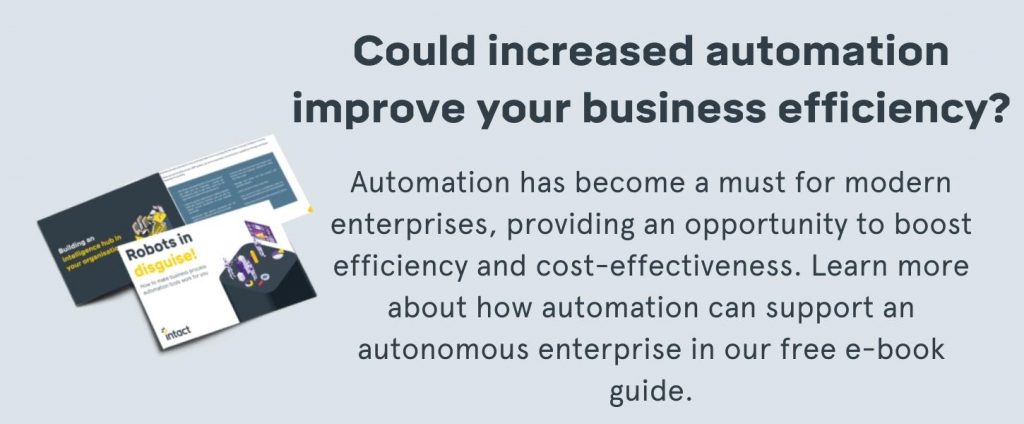Autonomy is a powerful and at times elusive attribute that can bring a wealth of benefits to your business. Difficult to pin down, it’s a trait that’s worth cultivating – giving you and your team greater freedom and flexibility to drive the business forward.
The good news is there’s never been a better time to introduce greater autonomy within your business. Technological advancements coupled with changing working practices now mean achieving autonomy is more practical and sustainable, so you’re perfectly placed to make it a part of your wider operational strategy.
But what exactly is workplace autonomy and why should you aim to create it in your workplace? And what benefits can it offer?
In this post, we’re taking a closer look at workplace autonomy, examining its key advantages and how it can affect different areas of your business, including your operations, your leadership, and your team members. Use the links below to navigate or read on for the full guide.
Quick Links
- What is Workplace Autonomy?
- How Autonomy Can Benefit Your Operations and Business
- How Autonomy Can Benefit Your Business Leadership and Decision-Making
- How Autonomy Can Benefit Your Colleagues and Teams
- How Technology Can Support Workplace Autonomy
What is Workplace Autonomy?
Workplace autonomy is the process of handing greater responsibility over to the wider workforce and entrusting junior members of the team to manage their own time. Rather than handing members of the team a roadmap of how every task should be completed along with rigid deadlines, workplace autonomy is built on every member of the team arriving at the end goal via their own route.
The process relies on team leaders and senior managers having faith and placing trust in their direct reports, providing a more basic brief and allowing the teams’ individual and collective processes and skills to thrive.
Whilst it is often difficult for experienced and senior members of the team to hand greater responsibility over to junior staff, there are a wealth of benefits as we will dig into below.
How Autonomy Can Benefit Your Operations and Business
From a commercial and technical standpoint, increased autonomy can be a transformative attribute. Let’s take a look at some of the benefits it can bring to your business and operations.
Can Help to Reduce Costs and Improve Efficiency
Since autonomy enables greater efficiency and the use of the latest tech solutions, it can systematically help to lower costs, reducing overheads in key operational areas. For example, rather than outsourcing specialist processes to third parties, greater autonomy empowers internal staff to find alternative solutions– leading to increased cost savings.
Business autonomy relies on trust, and when you trust your employees to perform at their best, this can help to streamline processes and day-to-day operations. And with fewer hoops to jump through to get things done, staff can drive efficiencies which, in turn, reduce costs, so you get more productivity and less bureaucracy.

Opens Up New Opportunities
When your staff are given the autonomy to explore new solutions and ways of working, this can easily lead to new opportunities and exciting ventures. Allowing choice and flexibility can open unseen and unexpected avenues, which can help you to drive your business forward and enable you to explore new areas and prospects.
Say, for example, one of your colleagues is given the freedom and means to learn a new skill through autonomous working practices. With that knowledge, they could transform key business functions and areas, introducing changes or solutions that augment your operations for the better.
Improved Organisational Culture
In many industries, organisational culture is just as important as output and productivity. Without the right ethos and philosophy, companies may find it hard to attract the right talent to get the business where it needs to go.
A lack of autonomy can tarnish a brand’s culture and perceived working conditions, fostering a climate of micromanagement and demotivated employees. Thus, encouraging increased autonomy is always of benefit from a cultural standpoint. Your people will feel happier, more engaged and more productive, which is a win-win scenario.
How Autonomy Can Benefit Your Business Leadership and Decision-Making
Business leaders who embrace autonomy can expect more in return from their subordinates. Here are some of the key benefits that autonomy can bring from a leadership perspective.
Streamlined Process Management
Autonomy is a dream scenario for business leaders, including supervisors, line managers and directors. It ultimately frees them from the fetters of granular, day-to-day project management, putting them in a position where they can focus on other tasks and trust that their teams are carrying out their duties as expected.
Of course, for this level of autonomy to work, you need some means of monitoring processes and task management – and that’s why having the right business management software in place is so important. An intuitive, centralised management solution can facilitate streamlined management and monitoring, allowing you to take a hands-off approach (essential for workplace autonomy) while retaining full operational control.
Data-Driven Decision-Making
Modern management solutions, like ERP software, have been a great autonomy enabler. Besides delivering a single source of truth, they can also be customised per user, role or department to work in a way they see fit. Allowing this type of autonomous working means improved decision-making, greater productivity and increased efficiencies.
With teams working autonomously on a centralised system, you’re well-positioned to oversee progress while tapping into accurate, real-time data insights. This, in turn, aids decision-making, making it significantly easier to approach strategic junctures without getting bogged down in day-to-day management and task supervision.

More Productive and Engaged Team Members
Handholding and micromanagement might feel like the right approach, but often it hinders trust, progress and employee engagement. By contrast, allowing employees to work autonomously can lead to simpler and more effective management; team members will be happier, more productive, and more engaged, which will ultimately make life simpler for those supervising them.
Of course, striking the right balance between being hands-off and supportive is crucial here. But, by combining autonomous working practices with intuitive business management tools, you can easily manage and oversee progress while allowing subordinates to spread their wings, develop skills and work in ways that suit them.
How Autonomy Can Benefit Your Colleagues and Teams
We’re sure by now you’ll have a rough idea of how autonomy can benefit individual team members. But to reiterate, here are some of the key advantages that you can expect:
- Greater overall happiness, morale and engagement
- A greater sense of accountability and responsibility for their work and projects
- Employees feel more valued since they’re being trusted to work at their own pace to complete tasks
- Since the completion of tasks is up to them, with minimal monitoring and overseeing, employees feel encouraged to work at their best
- Team members may feel motivated to learn new skills and broaden their abilities
- Autonomy contributes to a healthier team and organisational culture
- As employees can work in ways that suit them, they may enjoy a better work-life balance – an important consideration for remote teams and those working flexibly

How Technology Can Support Workplace Autonomy
Modern business management solutions have proven the perfect vehicle on which to encourage greater autonomy in the workplace. Businesses that embrace the latest tools and software, including integrated solutions like ERP, are well-positioned to let go of the reins and give their teams greater control and autonomy over their day-to-day work.
To explain how this materialises, ERP software is the perfect example. With such software in place, you can enjoy an overarching view of progress, pain points and KPIs, while team members complete tasks on a centralised, trackable system. In essence, they can work autonomously without compromising on the level of control and insights that you need to ensure timely decision-making.
What’s more, the nature of ERP software means that individual team members can explore new solutions and ways of working within the same technology infrastructure. With a range of supplementary modules, applications, and no-code customisation tools, there are always new ways to improve efficiencies and ways of working. This allows for total flexibility and exploration, with the option to scale up the use of new solutions if they prove successful.
Have you enjoyed this guide? For more useful business advice, click here to read the Intact blog in full. Or if you’d like to learn about our future-fit management solutions and how they can support increased autonomy in your business, visit the homepage or get in touch with our expert team today.






